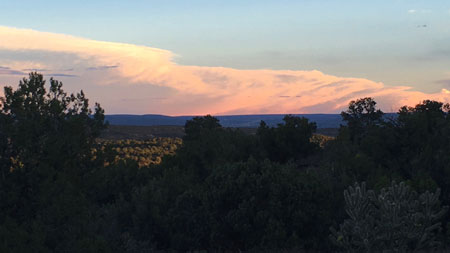Every time we are certain of something, we narrow our world.
“I can’t go hiking with you today because it’s too hot.”
I’m certain it’s too hot and I’m certain that too hot is “bad” for me, therefore I will stay home. If I might like to go hiking, but think it’s too hot, what happens if I remain open and curious?
Maybe I’ll go and take extra water. Maybe I’ll be willing to go for a short time. Maybe I’ll go, hike a bit and then sit in the shade. Maybe I’ll notice I don’t need certain conditions to be happy, to enjoy the day.

Me creating my own shade on a day that was probably too hot for me!
What if I avoid a specific person because I’ve decided she’s too shallow? What if she then tells me something deep and meaningful? What if I then notice I feel connected to her? What if I notice my certainty had kept me away from her for years?
What if you won’t grow your business because you’re not good at sales? What if you notice that you are the one who decided you’re not good at sales? What if you open to the infinite possibilities around how to sell? What if you release your certainty about sales and a used car salesmen being one and the same?
We might want to learn how to release certainty to give ourselves the gift of richer, fuller, more meaningful and expansive lives.
Okay, so how do we release certainty? I do often get too hot, I don’t like superficial and you’re not good at sales.
Wow, look how definitive are each of these statements. They sound like absolute truths when, in actuality, they are preferences or tendencies.
What would happen if I allowed myself to enjoy my life whether I’m “too hot” or just the right temperature? How might my life shift if I was curious about the person in front of me, instead of having already decided who she is? How might your business grow if you expanded your view of sales?
What if we accepted and embraced life on life’s terms instead of demanding our list of certainties?
As we begin to hear our selves say, “I can’t,” “I don’t like . . .,” “That’s not me,” we give ourselves the opportunity to release certainty in favor of openness and curiosity. As we notice our self-created suffering around not having our preferences, we can make a new choice in the moment to be happy anyway.
Perhaps a new perspective on “having it all?!?”
As always, I’d love to hear your thoughts and ideas . . .
(Excerpted from my forthcoming book, “Strong from Within: Simple perceptions and practices for transforming stress and overwhelm into clarity and purpose”)









